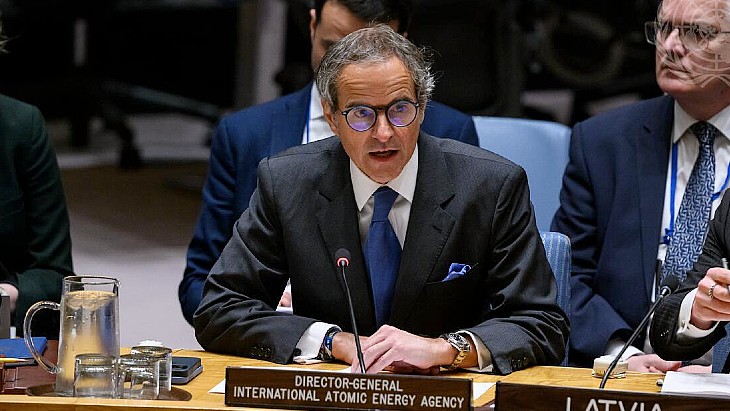IAEA's Grossi explains why blame is not being attributed for Zaporizhzhia attacks
19 April 2024
With a third report of a drone attack in two weeks around the Zaporizhzhia nuclear power plant area, International Atomic Energy Agency Director General Rafael Mariano Grossi has urged restraint from all sides - and explained why the agency has not pointed the finger of blame for the incidents.
 The IAEA's Grossi addressing the UN Security Council (Image: UN Photo/Loey Felipe)
The IAEA's Grossi addressing the UN Security Council (Image: UN Photo/Loey Felipe)The six-unit nuclear power plant has been under Russian military control since early March 2022 and is on the frontline of Ukrainian and Russian forces. It has had IAEA experts stationed at the site since September 2022 and the United Nations Security Council has backed Grossi's five key safety and security principles, including that no-one should store heavy military equipment at, or fire weapons from, a nuclear power plant, and no-one should fire at a nuclear power plant.
The Russian operators reported to the IAEA team at the plant that an attempted drone attack on the nuclear power plant's training centre had been "neutralised" on Thursday. The IAEA said its experts did not get access to the training centre, which is just outside the nuclear power plant site's perimeter to assess the incident.
Grossi said that the drone attack, if confirmed, would be the third in less than two weeks, saying: "It would be an extremely worrying development. Whoever is behind these incidents, they appear to be ignoring the international community’s repeated calls for maximum military restraint to avert the very real threat of a serious nuclear accident, which could have significant health and environmental consequences and benefit absolutely no one.
"So far, the drone strikes have not compromised nuclear safety at the site. But, as I told the United Nations Security Council a few days ago, these reckless attacks must cease immediately."
Following that address to the United Nations Security Council on Monday, Grossi was asked at a press conference why he did not say who he thought was responsible for the incidents.
He said: "You raise a very important point and it's a point that everybody is talking about, this issue of attribution and pointing a finger and saying 'it's this country or that country'. We are not commentators. We are not political speculators or analysts, we are an international agency of inspectors. And in order to say something like that, we must have proof, indisputable evidence, that an attack, or remnants of ammunition or any other weapon, is coming from a certain place. And in this case it is simply impossible."
He said that the recent attacks had been carried out by drones, which have a diverse range of trajectories and can hover and circle, and can be easily obtained: "Remember this plant is at the front line, it can go to the Russian occupied territory, it can come from different places. It could be manned from one side and belong to another side. So for us, it would be impossible ... to say it is, indisputably something coming from here, or from there. This is why we keep the information as accurate as we can. And we do not trade into speculating."
In response to a question which used the analogy of a yellow card and red card system such as that used in football and asked if he was ready to use them, he replied: "I have the red card, I have the yellow card, I have them ready in my hands. The thing, the most important thing, is that they see that the referee is there on the pitch."
Grossi said that if there was definitive proof "the IAEA would not be in the business of hiding anything ... if we have evidence of something, we do not have a problem in reporting, but we have to be extremely measured in what we do".
He also warned that in a war "there are sometimes operations leading the observer to believe that something is happening in a certain sense, while it is happening in a different sense, intelligence operations, and many other things. And the voice of the IAEA is very important, the credibility of the IAEA ... must be preserved. I am the guardian of this institution and I have to measure the words, so that when we put something on the public domain, it's something that is concrete and proven."
In a statement issued on Thursday, Grossi said that the 18th rotation of IAEA experts at Zaporizhzhia NPP had taken place on Tuesday, reaffirming his view that their presence was helping to reduce the changes of a nuclear accident.
In these extremely difficult and challenging times, I’m very encouraged by the strong support and unanimous appreciation of the IAEA’s important work expressed by the members of the Security Council. Everybody agrees that the IAEA’s role is indispensable as we do everything in our power to keep the plant safe and secure," he said.
I sincerely hope that our calls for maximum military restraint - both at the IAEA Board of Governors and the United Nations Security Council - will be heeded before it is too late. The dangers facing the plant have not gone away ... as we saw on 7 April, the situation can take a sudden and dramatic turn for the worse at any time."
He reported that the IAEA experts at the site had heard several rounds of outgoing artillery fire early in the week "as has been an almost daily occurrence in recent weeks and months". IAEA teams stationed at Ukraine's other nuclear power plants - Khelmitsky, Rivne and South Ukraine - as well as the Chernobyl site report that nuclear safety and security is being maintained despite the effects of the ongoing conflict "including air raid alarms on most days over the past week".
Researched and written by World Nuclear News
No comments:
Post a Comment